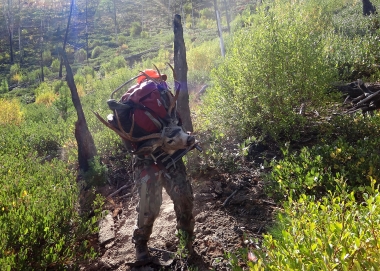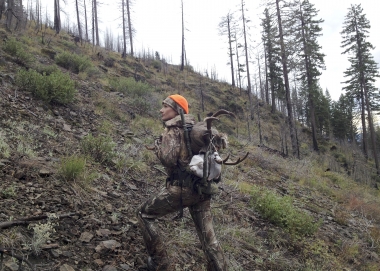
Hunter's checklist: Get ready for your hunt
Hunters know how easy it is to get focused on taking “the shot.” But a lot of planning and preparation goes into getting there. Use this hunter’s checklist to start planning early, and to remember what you need to carry in the field.

Begin in August
Start getting in shape. Hunting can be hard work. Are you ready pack your gear in for a week-long hunt or schlep field-dressed game back to your truck? Can you handle a 10-mile hike on uneven terrain, and then do it again the next day if you don’t find your target? If not, you know what you need to do.
Get the right maps and start scouting. Visit the area(s) you plan to hunt and start looking for game, and areas where they bed down, find food and drink water. Scouting also can be a great way to get in shape for the season.
Sight in your rifle/scope or bow. Many ranges offer free sight-in days.
Practice shooting. If you’ve done the hard work to get the target in your sights, you’ll want to make sure you hit it.
Look for sales on target and hunting ammunition. You’ll be able to practice more.
Practice calling. Grunt tubes, cow calls, rattles, diaphram calls. If you’re going to use a call, practice sounding like a deer or an elk before you get in the field.
Get landowner permissions. Hunting private land can be a great way to escape the crowds, so spend some time scouting local options and getting permission to hunt in the fall.
Start breaking in the new boots. Don’t let blisters or sore feet ruin your hunt.
Buy your tag now, while you’re thinking of it. You must buy your tag before the first day of the hunt, which may open earlier than the day you plan to hunt.
One week before your hunt
BUY YOUR TAG, if you haven’t already. Tsk, tsk.
Check the weather forecast. Chance of rain? Snow? Record high temperatures? Also make sure you’re prepared for unexpected conditions (rain, snow).
Check the batteries in your GPS, flashlights, headlamps, two-way radios, etc. And make sure you have spares.
Sharpen your knives. A dull knife just encourages swearing. And you're more likely to cut yourself with a dull knife. More swearing.
Begin assembling your pack items – use the checklist below as a guide.
Make last minute trip(s) to the sporting goods store. Seems like no matter how much gear you have, you need at least one more thing.
Let someone know where you're going, where you'll camp, what route you'll take there and back, how long you'll be gone, when you'll be back, and if and when you'll be able to check in (ex. will you be in cell phone range). This way if an emergency comes up at home, OSP will need to know how to find you.
Day of hunt
- Let someone know that you're off and remind them when you should be back.
- Charge your cell phone on the ride there.
- Eat a good breakfast – your Mother was right.
In the field
Whenever you’re venturing into the backcountry, even for a day, you should be prepared to deal with minor injuries, getting lost and unexpected changes in the weather. You will also need tools to field dress and carry your harvest.
Use the following checklist as a guide, but personalize it for your needs and situation.
Rules and such
- License/ tags/ hunter education card (if under age 18)
- Hunting regulations
- Blaze orange clothing (encouraged for all; required if under 18)
Field dressing and other tools
- Two knives/sharpening stone
- Small hand saw
- Game bags
- Nitrile or similar gloves (keeps hands clean and, in a pinch, cell phone dry)
- 50 feet of 550 paracord or similar rope
- Multi-tool
- Duct tape
- Large garbage bags
- Rubber bands
- Zip ties in various sizes
Weapons, ammo and hunting aids
- Firearm/ammunition/scope
- Bow/arrows
- Game calls
- Orange flagging ribbon – to mark trail and location of kill
- Binoculars
Food and water
- At least two quarts of water
- Food for at least one day
- Water filter and/or water purification tablets
Navigation
- Maps
- Compass
- GPS
Signaling
- Whistle
- Small mirror
- Cell phone
Emergencies
- First aid kit
- Cash – at least $20
- Toilet paper
Communication
- Camera/cell phone (remember to submit your photos to ODFW)
- Pen/paper
Unexpected night in the field
- Emergency blanket
- Fire – waterproof matches, lighter, candle
- Flashlight/headlamp and extra batteries
Planned night in the field, aka camping
- Shelter – tarp, tent
- Lightweight sleeping bag
- Warm clothes
- Camp stove
- Extra food and water
Above all, stay safe and have a good hunt!



